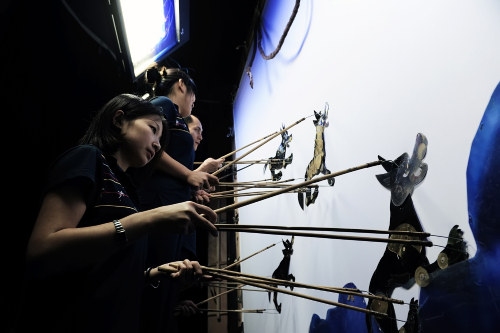|
 |
| TIME-HONORED TALENT: Performers stage a Hunan Shadow Play show (FILE) |
In addition to these better known schools of opera, there are many minor forms of opera and stage performances in Hunan like puppetry and shadow plays. Hunan Shadow Play was also honored in the first batch of China's state-level intangible cultural heritage back in 2006.
Heritage preservation
Zou has been studying local opera for decades. According to his figures, there are only nine professional Qiju Opera troupes today, 30 percent the number in 1983, and only five of them are able to put on regular performances. The staging of Huagu Opera performances has also waned, with only 11 active troupes left today. Smaller operas may not have a single professional troupe dedicated to them. Moreover, those troupes suffer from a lack of performers and lackluster audience turnouts.
To Zou, there must be different protection measures for operas according to their current states. He suggested that the government should encourage the development of operas that have audiences but can't generate a profit. Zou also stressed that operas that espouse traditional cultural values and are economically viable must give priority to training the next generation of performers. To him, creating new, modern plays instead of insisting on traditional versions is of paramount importance. It was suggested by him that taking influence from foreign operas and other Chinese operas would be helpful to Hunan's local operas.
Zou is optimistic about local operas' future. In his view, traditional operas do not lack an audience. Moreover, the government has paid more and more attention to traditional operas. It has set up intangible cultural heritage protection centers throughout Hunan, which has in turn helped provide capital and performers for traditional operas. "Opera will neither wither, nor die," Zou said.
To protect local operas, Hunan Province has also adopted many measures to create a good environment for their development, including sponsoring regular performances of local operas. For example, there is a project called "public theater," which provides opportunities to non-professional performers and fans of different local operas to perform in public. The Hunan Government also encourages traditional opera troupes to give touring performances in rural areas across the province.
Hunan's local operas have benefited from such policies. Hunan Opera, for instance, went through a hard time owing to an influx of modern culture a decade ago, according to Zhang Kelang, head of the Provincial Theater of Hunan Opera. Back then, it lacked both audiences and performers. Zhang's theater had only 37 performers. "A full-size Hunan Opera play requires at least 100 participants. We couldn't give a complete performance of a traditional play at that time," Zhang recalled.
Zhang said the theater has received a huge amount of financial support in recent years, and it has invested 9 million yuan ($1.5 million) into new plays and repairing its infrastructure. The theater has also trained 37 young performers in the past 10 years. "Now, they are the hope and the future of Hunan Opera," said Zhang.
Email us at: dingying@bjreview.com
| 